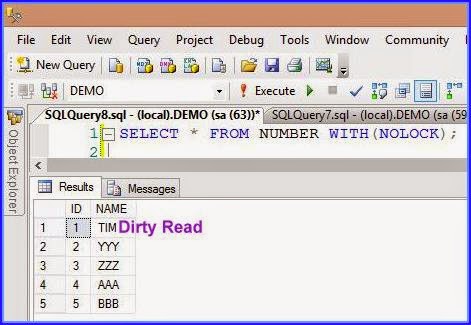Table Hint:
In this blog
post will talk only about NOLOCK and READPAST.
We use Table
Hints to override the default behaviour of the query optimizer for the duration
of the data manipulation language (DML) statement by specifying a locking
method.
Table hints
are specified in the FROM clause of the DML statement and affect only that particular
table.
Syntax:
Select column_name1,column_name2..,column_namen from Table_name with(Table_Hint)
NOLOCK:
This
table hint NOLOCK is also known as READUNCOMMITTED, is applicable to SELECT
statements only. NOLOCK indicates that no shared locks are issued against the
table that would prohibit other transactions from modifying the data in the
table.
This
increases concurrency and performance of the transaction because the database
engine does not have to maintain the shared locks involved. The problem with
NOLOCK hint is DIRTY READ, because the statement does not issue any locks
against the tables being read, some "dirty," uncommitted data could
potentially be read.
A
"dirty" read is one in which the data being read is involved in a
transaction from another connection. If that transaction rolls back its work,
the data read from the connection using NOLOCK will have read uncommitted data.
This type of read makes processing inconsistent and can lead to problems.
READPAST
READPAST
is less popular than NOLOCK. After specifying this hint into the query Database Engine do not read rows
that are locked by other transactions. When READPAST is specified, row-level
locks are skipped. That is, the Database Engine skips past the rows instead of
blocking the current transaction until the locks are released.
The
advantage of READPAST is that dirty reads will not happen because the hint will
not return locked records. The problem with this is that you will not get all
your records, because locked rows will be skipped.
Let see
the same with a sample database that is “DEMO”.
USE master
GO
CREATE DATABASE DEMO
GO
USE DEMO
GO
CREATE TABLE NUMBER(ID INT, NAME CHAR(3))
GO
INSERT INTO NUMBER VALUES(1,'XXX'),
(2,'YYY'),
(3,'ZZZ'),
(4,'AAA'),
(5,'BBB')
GO
SELECT * FROM NUMBER;
The following transaction will show how NOLOCK and READPAST
behaves. In the script below, I begin a
transaction and updated a record in the NUBER table as below:
BEGIN TRAN
UPDATE NUMBER SET NAME='TIM' WHERE ID =1
Now open another session and execute the below
script and see the OUTPUT for same:
SELECT * FROM NUMBER WITH(NOLOCK);
From the output
you can see that the name for ID is TIM. The data for ID 1 is inconsistent. This is DIRTY READ. What if the
update transaction is roll backed, well in that case the select statement read the data which never existed in database.
Now lets see that how READPAST will behave in this situation:
SELECT * FROM NUMBER WITH(READPAST);
From the output
you can see that the record for ID 1 is missing. As this row is locked by some
other transaction. So READPAST table hint skipped that row.
Rollback the above update transaction. Now, Clean the database "DEMO" as:
Use master
Go
Drop Database Demo
Go
Thanks For Reading this Post!!!



No comments:
Post a Comment